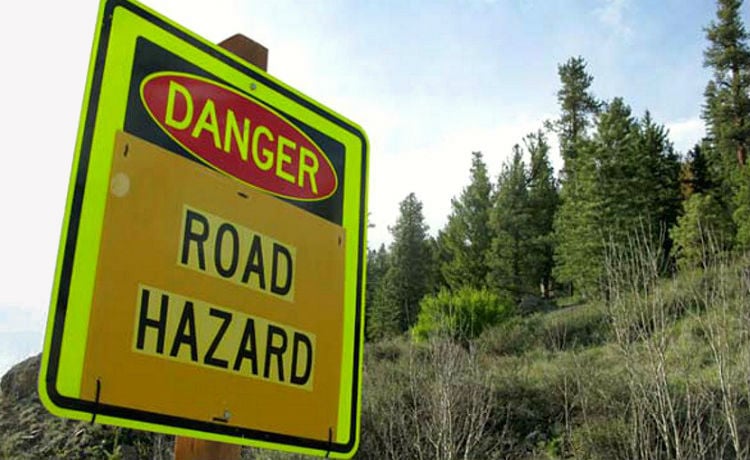Becoming a free-spirited, wandering gypsy is the stuff rock music fantasies are made of. For most of us, the reality is slightly different. That’s because everyone needs a “home base” even if it’s one they rarely visit. Here’s why choosing a home base for full-time RVers is a must.

Even the full-timing lifestyle has bureaucratic hazards.
A Home Base for Full-time RVers is More Than a Location
Nine years ago when we started traveling we naively assumed we could always use friends and family’s addresses for things like mail and vehicle registration. We didn’t know that by declaring addresses in different states we would subject ourselves to scrutiny by banks, motor vehicle departments and scariest of all, the Internal Revenue Service.
Why You Need to Choose a Domicile Home Base
Thankfully wise full-time RVers’ advice straightened us out with some answers about full-timing. We learned that you can’t cherry pick mailing addresses for things like health insurance, vehicle registration or tax filing. This is one of the biggest mistakes rookie full-timers make. It’s not cool with the government to buy health insurance in a state with low premiums while file federal income taxes from a state that doesn’t have personal income tax. Do it too often and you’ll suffer the repercussions. The tax man will find you at the RV park and health insurance auditors will require you to return the fees they paid to your doctors.
First, don’t confuse “home base” with “domicile” or “residency.” A residency is a place where you simply live for the time being, while a home base or “domicile” means you not only live in that state, but you intend to stay there long-term by taking care of legalities from that state.
You must declare a domicile because the government assumes everyone lives a stationary lifestyle with a fixed address. You can own property and vehicles in other states, but the majority of ties to things like life and medical insurance, taxes and vehicle registration all must be linked to your primary “domicile.”
Questions to Ask Yourself
Full-time RV domicile experts like the “RV Tax Man” George Montgomery offer great advice about choosing a home base for full-time RVers. It makes the most sense to choose a home state with the biggest fiscal benefits for your situation. Before choosing a domicile state, consider things like:
- Does the state collect personal income tax? Income tax-free states are great, but many compensate by charging higher sales and/or property taxes.
- Health insurance premiums. States set their own health insurance company premiums. Costs differ in all 50 states and even cities.
- Vehicle registration fees. Vehicle tag costs vary from state-to-state and even county-to-county. Plus, some require a emissions check, some don’t, which is of particular importance to RVers driving diesel-powered vehicles.
- Ease of running a business from that state. Depending on your business, when working from your RV home, some states will be more friendly than others – or create a nightmare of red tape.
We found that choosing Texas as our domicile was the right move for our situation. Texas has all the right criteria for our business and personal needs. Plus, we love the Lone Star State and visit all the time.
Considerations like a home base for RVers isn’t fun when you’re dreaming of a road-tripping lifestyle. But if you plan on traveling more than six consecutive months each year, it’s wise to get this technical issue out of the way from the beginning. Failure to do so can put an end to your free-wheeling lifestyle before you can say “garnished wages.”

Interesting perspectives. Different strokes for different folks. I’m buying a new RV in Texas even though I live 3 states away. Lower sales tax and lower license fees first year. But because Texas requires the trailer be inspected each year for license and I don’t like Texas enough to visit every year I’ll register it in my home state the 2nd year. My business is in Arizona and I pay both federal and state taxes in Arizona and file again in my home state.. I have lived full timer in a RV while working in Arizona while having a domicile in another state for 11 years. Requires bills to be auto pay from that address. Must be computer literate. Tough life must be flexible and have a good CPA????
Interesting perspectives. Different strokes for different folks. I’m buying a new RV in Texas even though I live 3 states away. Lower sales tax and lower license fees first year. But because Texas requires the trailer be inspected each year for license and I don’t like Texas enough to visit every year I’ll register it in my home state the 2nd year. My business is in Arizona and I pay both federal and state taxes in Arizona and file again in my home state.. I have lived full timer in a RV while working in Arizona while having a domicile in another state for 11 years. Requires bills to be auto pay from that address. Must be computer literate. Tough life must be flexible and have a good CPA????
Do any full time rv people that doesn’t own a home have a list of deduction I can take or the name of a good tax preparer. I have worked in 3 states and have a home base in another state
Marie, do check out the book “Can I Write Off My RV?” by George Montgomery. He’s a super smart tax preparer with full-timing experience, and a great guy too. You’ll like him.